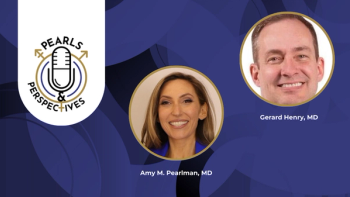
Expert explains latest findings with oral softgel capsule for testosterone replacement therapy
"We didn't see any clinically significant changes on the prostate gland, which is very important for the urologists who see people who have prostate cancer or prostate enlargement," says Ronald Swerdloff, MD.
At the 2021 Sexual Medicine Society of North America Fall Scientific Meeting, promising results on the efficacy and safety of oral testosterone undecanoate (Jatenzo) were presented.1 Lead author Ronald Swerdloff, MD, highlights the significance of this data regarding the treatment of patients with hypogonadism and why it is different from previous oral agents. Swerdloff is a professor of medicine and senior investigator at The Lundquist Institute, Harbor-UCLA Medical Center and David Geffen School of Medicine, University of California, Los Angeles.
Please discuss the background for this study.
Male hypogonadism is a condition that occurs in a significant number of our population and there are a number of testosterone formulations and routes of administration that are used to treat this condition. Routes of administration available to physicians include injections, transdermal preparations, transbuccal administration, long-acting injectables, intranasal and oral medications. Until the last couple of years, we did not have an oral preparation that we could use effectively and safely. In 2019, the FDA reapproved a new oral formulation of testosterone undecanoate (Jatenzo), which is taken twice a day as capsules and absorbed through the intestine. The difference between this compound and other compounds that were orally administered is that this new formulation is absorbed through the lymphatic system, rather than going directly to the liver. The reason why that was important is that previously, the oral preparations that were available either were very short-acting or had liver toxicity. We demonstrated the efficacy of Jatenzo, showing that this preparation would result in blood levels of testosterone that were quite normal even when ingesting a normal diet. We have nowpresented two year safety data demonstrating longer term safety of the preparation.
What were some of the notable findings of this study? Were any of them surprising to you or your co-authors?
This study had previously shown that you could increase the testosterone level from clearly low levels into the normal reference range. We were quite sure about the efficacy, but we also wanted to demonstrate, over a 2-year period of time, that the safety criteria were met. The best part about this study is that we clearly showed that there was no significant liver toxicity. We also looked at other types of changes that might be important. There were very small increases in blood pressure (between 5 to 7 mm of mercury) that have been seen with other testosterone formulations. In addition to that, there was a small increase in the hemoglobin and hematocrit. Five of about 86 individuals had levels that were high enough that we thought the dose should be reduced in those individuals by the practicing physician. That's also a class effect. The stimulation of red blood cell production can be a benefit for people who are anemic, since the low levels of hemoglobin will be increased into the normal range.
We didn't see any clinically significant changes on the prostate gland, which is very important for the urologists who see people who have prostate cancer or prostate enlargement. Thus, at least for the 2-year period of time, prostate disorders didn't seem to be a problem either in terms of symptom score or any significant increase in the incidence of prostate cancer.
We add that the study was not powered to detect a small increase in prostate cancer but ongoing studies with a testosterone gel are looking at much larger population of men with hypogonadism to confirm testosterone prostate safety over a 5 year treatment interval.
In the present study, there was nothing that was surprising. I think that the real positive thing about this is that we now have an oral drug when taken twice a day gives another option to patients who are being managed by urologists, internists, and endocrinologists. There is a lot of comfort in that for the patients as well as the prescribers.
What is the significance of these findings for providers and for patients?
I think the significance is that we have an oral agent, which many patients prefer, and that this oral agent is effective in raising the low testosterone levels into the normal range. Most importantly, for the safety study, it looks like the medication has no concerning adverse effects, although we recommend physicians monitor hemoglobin and hematocrit levels to detect erythrocytosis. If present, you can adjust the dose, which can be done with this oral preparation because there are different dosages available. In this study, the individuals may have had their dose increased or decreased by 50%, but most of the individuals ended up with the basic starting dose.
What is the take-home message for the practicing urologist?
The take-home message is quite clear, and it is that you have another medication which you can use to treat patients with hypogonadism, and the medication is not only effective, but it seems to be quite safe. You need to talk to your patients and ask them what route of administration they would prefer. Some people like injections, some people like administration on the skin, and some people would prefer pills. I might say that one of the benefits of a pill over the skin medication is that the transdermal medication could be transferred to a female partner or a child by contact with the skin, which may an issue of concern because of the FDA required a boxed warning for transdermal testosterone medications.
Is there anything else you feel our audience should know about the findings?
The good news is that the pharmacokinetics of this oral testosterone undecanoate is such that the levels, if taken twice a day, remain in the normal range. Thus, you don't have as many ups and downs seen previously in other formulations of the same drug. This is a real improvement in that regard.
Reference
1. Swerdloff R, Honig S, Wang C, et al. Two-Year Administration Data of an Oral Testosterone Undecanoate (TU) Formulation in Hypogonadal Men. Paper presented at: 2021 Sexual Medicine Society of North America Fall Scientific Meeting; October 21-24, 2021; Scottsdale, Arizona. Abstract #003
Newsletter
Stay current with the latest urology news and practice-changing insights — sign up now for the essential updates every urologist needs.






